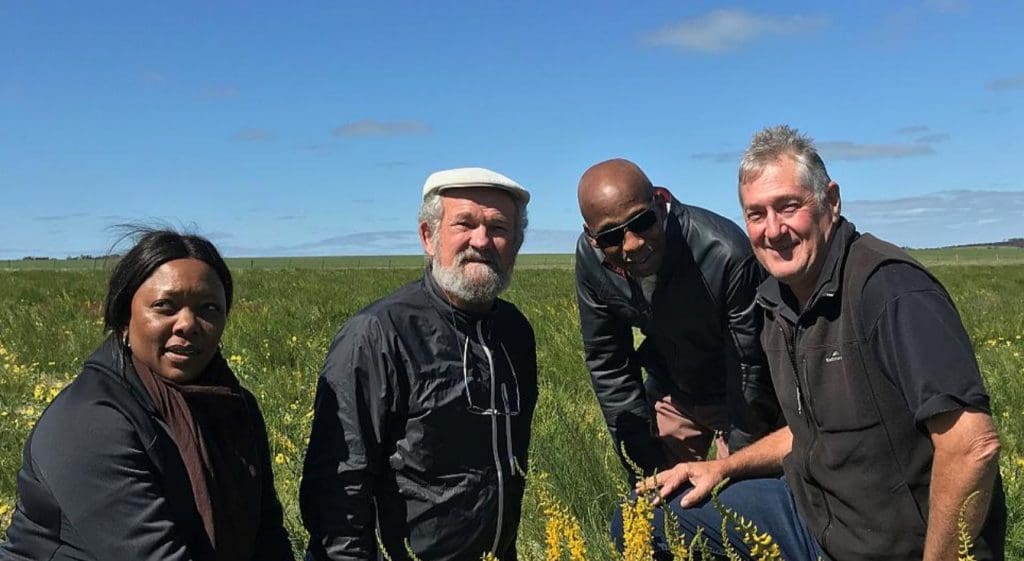
Cynthia Motsi, left, from the Agricultural Research Council, Professor Ben-Erik van Wyk from the University of Johannesburg, ARC CEO and president Dr Shadrack Moephuli and Professor John Howieson from Murdoch University in a lebeckia crop.
A NEW perennial legume with the potential to revolutionise grazing in sandy infertile pastoral areas will be available to Australian and South African farmers next year.
Millions of hectares of sandy, infertile Australian farmland could benefit from the commercialisation of a South African shrub, allowing farmers to better carry sheep over the summer-autumn period.
Researchers at Murdoch University’s Centre for Rhizobium Studies have undertaken a decade-long global search for legume plants capable of surviving Western Australia’s harsh, dry summers and sandy soils.
They discovered lebeckia, a perennial legume, in the Western Cape of South Africa and commenced trials on the poorest sandplain soils of the Western Australian Wheatbelt.
WA Agriculture Minister Alannah MacTiernan recently witnessed the signing of a commercialisation agreement for the new cultivar of lebeckia called Isanti (Chosa for sand) by Murdoch University Deputy Vice Chancellor, Research and Innovation, Professor David Morrison and Dr Moephuli.
Under the agreement, a royalty on seed sales will be paid to the Agricultural Research Council. The new crop will be also made available to South African farmers, with the first seed expected to be available next year.
Lead researcher Professor John Howieson said lebeckia was designed to be used by farmers on soils that may otherwise be completely unproductive.
“Lebeckia has real potential to turn as much as three million hectares of Australia’s marginal farming lands into much more productive country, where its presence in pasture over summer could allow farmers to carry more sheep, grow more wool and provide better animal husbandry.
“We have recorded very promising results in agronomy, soil fertility and feed quality trials,” said Professor Howieson.
“It is a long sought after outcome of legume science in this State given its ability to grow during summer on infertile sandy soils.”
Professor Howieson said the plant had the potential to create substantial savings for farmers, reducing the need to purchase supplementary feed, and support higher animal stocking rates.
“Economic analysis has shown that using lebeckia on sandy soils could be worth up to $400/ha per year to the farmer.
“We think it will be incredibly valuable for farmers who can lamb or wean into it, and provide high-quality feed and shelter,” he said.
Murdoch has been working with the South African Government to secure full commercialisation rights.
South African Agricultural Research Council President and CEO Dr Shadrack Moephuli said the growing of lebeckia had economic benefits to farmers, especially those with sandy and acid soils.
“Lebeckia is an acid tolerant legume that has been developed by the Agricultural Research Council and Murdoch University from genetic material collected on the acidic soils derived from sandstone in the Western Cape.
“As cultivation and alien invasion reduces the soil pH, this species can be grown in soils affected by acidification,” Dr Moephuli said.
“This is another milestone and innovation by the two institutions to assist the farmers to produce food for the growing population.”
Professor Howieson thanked David Quartermaine and Ted Astbury for their strong support for the lebeckia program by allowing intensive field research on their farms for the past six years.
The research project was funded by Murdoch University, with support from the Australian Centre for International Agricultural Research. The first seed will be available for sale next year.
The South African scientists and administrators visited WA to attend the 9th Annual Africa Australia Research Forum Annual Africa-Australia Research Forum which forms part of the Africa Down Under conference.
The forum is part of the Third Murdoch Commission, a research investigation bringing together international experts and thought leaders to work on pressing problems and issues of public concern to Africa.
Ms MacTiernan said Lebeckia could be a game changer for WA sheep farmers, providing an alternative feed source for livestock during periods of lower rainfall and in dry years.
“It has the potential to support the welfare of grazing animals, and its nitrogen-fixing qualities could massively boost the productivity of currently wasted soils.
“Congratulations to Professor John Howieson and his team at Murdoch University for this achievement,” she said.
“John has worked for years to reach this point, and our State is deeply grateful for his dedication to agricultural R&D.”



I would love to trial some.